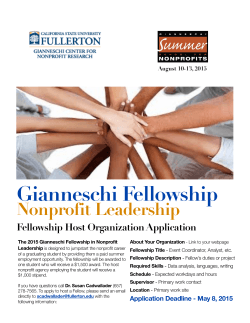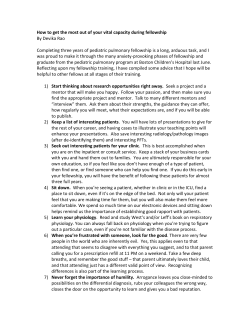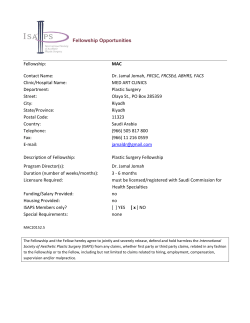
Request for Proposals here. - Pratt Center for Community
P r at t I N S T I T U T E TACONIC FELLOWSHIP REQUEST FOR PROPOSALS B e c o m e a 2015-2016 Ta c o n i c F e l l o w Applications must be submitted by Friday April 24, 2015 at 5:00pm DEAdline extended! aPPLICATION DUE mAY 4TH AT 5PM Pratt Center for Community Development invites proposals from Pratt Institute faculty, staff, and students for the third year of the Taconic Fellowship program. The Fellowship was made possible by a grant from the Taconic Foundation and provides financial awards in support of field work that aligns with the Pratt Center’s goals of sustainability and equity in community development. The goals of the Fellowship are to expose more disciplines to community development work and to support Pratt Institute’s commitment to collaboration, interdisciplinary projects, and service learning. The Center is now accepting proposals for new community-serving projects. Please see inside for more details. For more information, please contact Paula Crespo at pcrespo@prattcenter.net OVERVIEW BACKGROUND Pratt Center for Community Development is pleased to announce the third year of the Taconic Fellowship Program and to invite applications from Pratt Institute faculty, staff, and students. Made possible by a grant from the Taconic Foundation, the Fellowship provides financial awards for projects that align with Pratt Center’s urban planning and policy work in support of sustainable and equitable community development. The goals of the Fellowship are to expose more disciplines to community development work while supporting Pratt Institute’s commitment to collaboration, interdisciplinary projects, and service learning. Pratt Center for Community Development works for a more equitable and sustainable city for all New Yorkers, by empowering low- and moderate-income communities to plan for and realize their futures. The Center was founded at the birth of the community development movement as the first university-based advocacy planning and design center in the U.S. As part of Pratt Institute, we leverage professional skills – especially in urban planning and public policy – to support local organizations in their efforts to improve the quality of life in neighborhoods and promote sustainable development. We work with community-based organizations, small businesses, and the public sector to develop innovative strategies toward an equitable and sustainable NYC. The Center is now accepting proposals for projects for the 2015-2016 school year that relate to neighborhood planning, economic development, community design, affordable housing, sustainable development, and/or other urban issues confronting low and moderate-income communities in New York City. (See the “Project Eligibility” and “Evaluation Criteria” sections of this RFP for more information.) In keeping with Pratt Center’s approach to urban planning that includes closely partnering with community-based and other related non-profit organizations, applicants must propose a project that directly serves a non-profit community-based organization, including but not limited to community development corporations, issue-based advocacy organizations, merchants associations, or other types of neighborhood-based and neighborhood-serving advocacy groups. Applicants can propose a project with a group they already know or with whom they already work. ELIGIBILITY Pratt Institute faculty (including adjuncts, visiting instructors, part-time and full-time professors), full-time and parttime administrators, and students (full-time or part-time, undergraduate or graduate) are eligible to apply. Partnerships between faculty and students are strongly encouraged. Award amounts are between $1,000 and $10,000 per project, and awards will be disbursed to faculty members in the form of a stipend and to students as part of their Pratt Institute financial aid package. Fellowship requests should not exceed $10,000 total; Pratt Center reserves the right to offer partial funding to some applicants. A detailed budget is requested as part of the application (see the “Required Information” section on page 3.) The deadline for proposals is Friday April 24, 2015 for projects that will take place between September 2015 and June 2016. We will consider projects that occur during Summer 2015 as well, but stipends will not be available for disbursement until Fall 2015. A panel of reviewers from Pratt Center and Pratt Institute will evaluate proposals for their feasibility, capacity to meet the project’s stated goals, and commitment to advancing equitable and sustainable urban development. Final selections will be announced by mid-May. p. 1 of 3 PROJECT ELIGIBILITY EVALUATION CRITERIA Proposed projects must meet the eligibility requirements below. To see descriptions of Taconic-funded projects from previous years, please visit the Taconic Fellowship web page. A panel of reviewers from Pratt Center and Pratt Institute will evaluate proposed projects for their feasibility, capacity to meet the project’s stated goals, and commitment to the principles of equity and sustainability. Specifically, reviewers will make decisions based on: 1. Partnership with an organization that serves as a community-based client for the project The Taconic Fellowship supports projects that use a groundup, community-based approach to tackling issues of urban sustainability and socioeconomic equity. In order to help ensure this, projects must directly serve and relate to a community client’s existing program or initiative area. 2. Address one or more of the following areas of urban sustainability and/or socioeconomic equity: • Affordable housing preservation or development • Climate change / resiliency • Commercial corridor revitalization • Community design • Community planning • Economic development • Energy efficiency and the built environment • Environmental justice • Environmental sustainability • Land use • Open space • Social architecture • Transportation planning / public transportation • Urban design 1) Significance and relevance Does the proposal address a problem or question in the arena of urban community development and/or urban sustainability and/ or socioeconomic equity? 2) Community impact Will the project meaningfully impact a community and work towards a needed change? How? 3) Capacity for success What are the qualifications of the team of students and faculty? How are their interests and skills a good match for the project? 4) Approach and method Is the project proposal adequately developed for the purpose of the project and commensurate with the stated project goal? Does the proposal allow for adequate collaboration and communication with the community partner to ensure feasible outcomes? 3. Intention to make a meaningful impact Taconic-funded projects should strive to make a meaningful impact on the community and/or community-based client that they serve. While consciousness-raising is an important aspect of making broader societal change, Taconic projects should endeavor to make actual change. 4. Based in New York City Only projects based in New York City will be considered. As such, the community client must also be located within the five boroughs. For examples of past Taconic Fellowship projects, please visit http://prattcenter.net/taconic-fellowship p. 2 of 3 REQUIRED INFORMATION FOR PROJECT PROPOSALS Applications must be submitted via email to paula Crespo at pcrespo@prattcenter.net by Friday April 24, 2015 at 5:00pm aPPLICATION eXTENDED! dUE mAY 4TH AT 5PM Proposed projects should be briefly described in a letter of intent that addresses the points below. Please note that accepted projects will require a complete list of project personnel being paid by the Fellowship – faculty and students inclusive – prior to contract signing in June 2015. 1. Proposer’s name, title, department affiliation, and contact information 2. Goal of the project, with specificity about the issue or need it addresses 3. Name, location/catchment area, constituency, and leadership structure of the community partner organization 4. Methodology for approaching and addressing the issue and for engaging the community partner in the work 5. Proposed timeframe for the project (Summer 2015, Fall 2015, and/or Spring 2016) IMPORTANT BUDGETARY CONSIDERATIONS: 1. Taconic Fellows (whether faculty, administrators, or students) will pay for all project expenses out of their own pockets. These costs are indirectly reimbursed through the stipend for Faculty Fellows and Administrator Fellows, and through tuition remission or other financial offering by Pratt Institute for Student Fellows. Pratt Center will not provide funds other than in the form of the stipend for faculty and administrators and financial aid through the Institute for students. 2. Faculty and Administrator stipends are distributed by Pratt Institute, which applies the same tax and withholding policies for the Taconic Fellowship stipend as it does for regular payroll. 3. For approved projects, the budget submitted as part of this application can be amended with the approval of Pratt Center prior to contracting. Once Fellows sign their contracts in June, the total budget amount cannot be amended. FOR MORE INFORMATION For any questions that are not addressed in this RPF, please contact Paula Crespo, Senior Planner at the Pratt Center for Community Development at pcrespo@pratt.edu or (718) 6378646. 6. If you are a faculty member: area of study/major of all students who will be paid under the Taconic Fellowship award (and if possible, the names of those students) 7. If you are a student: name of the faculty member who will mentor you in this project 8. Scope of work for the project (can be in draft form) – what will the work be, and what are the deliverables? In addition, applicants must submit the following: • Signed letter of support for the project from the community partner organization • Project budget that delineates ALL project expenses, including (but not limited to): • Faculty member(s) time on project (to be paid in the form of a stipend) • Student(s) time on project (to be paid as part of students’ Financial Aid package from Pratt Institute) • Materials and supplies • Space rental • Travel p. 3 of 3
© Copyright 2025











